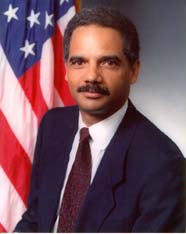 U.S. Attorney General Eric Holder is expanding the Justice Department's new policy to not pursue mandatory minimum sentences for drug offenses and other nonviolent crimes.
U.S. Attorney General Eric Holder is expanding the Justice Department's new policy to not pursue mandatory minimum sentences for drug offenses and other nonviolent crimes.
Holder said in a speech Thursday that he has issued new guidelines to prosecutors to ensure people who have already been charged -- or have cases that have not yet been completed and haven't yet reported to prison -- can benefit from the new policy.
"I am pleased to announce today that the Department has issued new guidance to apply our updated charging policy not only to new matters," Holder said, "but also to pending cases where the defendant was charged before the policy was issued but is still awaiting adjudication of guilt.
"By reserving the most severe prison terms for serious, high-level, or violent drug traffickers or kingpins, we can better enhance public safety. We can increase our focus on proven strategies for deterrence and rehabilitation. And we can do so while making our expenditures smarter and more productive."
In August, Holder announced that the Justice Department was making a major change in how it treats nonviolent offenders. It's part of an effort to make sure the toughest sentences are reserved for more serious crimes. In addition to those changes, Holder also called for expanding the use of "compassionate release" of those incarcerated who "pose no threat to the public," and said the Justice Department is taking steps to identify practices for enhancing the use of drug treatment and community service programs as alternatives to jail.
The idea already has taken hold in many conservative circles. Several states, including Texas and Georgia, and prominent Republican lawmakers are on board with the change in policy because it could save money by reducing the prison population, and it fits into conservative efforts to curb the federal government's size and budget.
Portland and Seattle
Free Subscription to Breaking News
Free Subscription to Breaking News





















































































































































































































































































































































